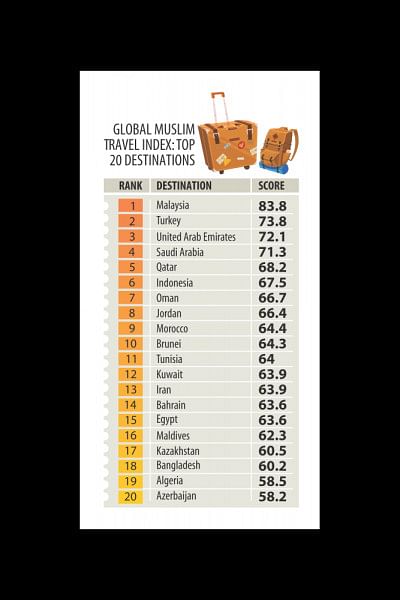Bangladesh becoming a top spot for Muslim travellers

Bangladesh has found a place among the world's top destinations for Muslim travellers, largely thanks to its availability of Muslim-friendly services and facilities, according to a study.
The Global Muslim Travel Index 2015 developed by MasterCard, a payment network provider, and CrescentRating, the world's leading authority on Halal-friendly travel, ranked Bangladesh 18th on the list of destinations, which are members of the Organisation of Islamic Cooperation.
Malaysia came first for OIC destination, followed by Turkey, United Arab Emirates, Saudi Arabia and Qatar.
Singapore came in first for the non-OIC destinations, which also saw Thailand, UK, South Africa and France make the top five. The index looked at data covering 100 destinations, creating an overall index.
All the destinations were scored against a backdrop of criteria which included suitability as a family holiday destination, the level of services and facilities it provides, accommodations, marketing initiatives as well as visitor arrivals.
Each criterion was then weighted to make up the overall index score.
The study, which was released yesterday, showed that Bangladesh received 67,000 Muslim arrivals last year, which is 19 percent of the total arrivals.
Last year, some 108 million Muslim travellers spent $145 billion globally, representing 10 percent of the entire travel economy, it said.
The Muslim travel market is forecast to grow to 150 million visitors a year by 2020, and their annual spending will reach about $200 billion, according to the study.
Given the significance of the segment, MasterCard and CrescentRating have come together to develop and maintain the index, it said.
The index has set a real precedent for the tourism industry, said Fazal Bahardeen, chief executive of CrescentRating and HalalTrip.
“Not only is it the most in-depth research that we have undertaken so far on the fast-growing Muslim travel market, but it has also provided all stakeholders with some invaluable insight into how the halal-friendly tourism sector is growing and developing from a global perspective.”
“Travel continues to be a core passion for consumers and we are confident the index will prove to be a trusted resource for this important, fast-growing traveller segment,” said Matthew Driver, president for Southeast Asia of MasterCard.
Not surprisingly, Saudi Arabia saw the highest number of Muslim arrivals in 2014 of 10.2 million, followed by Turkey at 8.1 million.
The overall average score for 40 destinations currently stands at 56, while the overall average index score for the complete 100 destinations is at 43.8.
From a regional perspective, Asia Pacific destinations lead with an average score of 54.
The study also said the Muslim population is growing rapidly and is expected to become 26.5 percent of the world's population by 2030.
The majority of the Muslim population comes from some of the fastest growing economies such as Indonesia, Malaysia, Turkey and the Gulf countries.
Muslims are now becoming an important consumer market for the entire world. They will become an increasingly important segment for businesses across all sectors.
The top 100 destinations ranked in the report are taken from 110 studied, including 29 OIC destinations and 81 non-OIC destinations. These 100 destinations represent more than 95 percent of Muslim visitor arrivals in 2014.

 For all latest news, follow The Daily Star's Google News channel.
For all latest news, follow The Daily Star's Google News channel. 



Comments